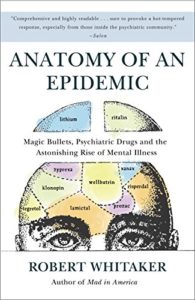May is Mental Health Awareness Month in America and with it comes a growing appreciation and acceptance that the associated health issues are at an all-time high. While it’s reassuring that the stigma too often attached to mental health issues continues to dwindle, enormous professional and personal challenges remain when comes to understanding the root causes of these problems and how best to treat them. WellWell recently spoke with Robert Whitaker, author of Mad In America: Bad Science, Bad Medicine, and The Enduring Mistreatment of the Mentally Ill and Anatomy of an Epidemic: Magic Bullets, Psychiatric Drugs, and the Astonishing Rise of Mental Illness in America, about the disruptive expansion of mental health drugs and danger of over-prescribing them.
 Mental health is at an all-time level in terms of acceptance and awareness. However, people still seem to be misunderstanding a lot about the treatment and issues surrounding it. Why is that?
Mental health is at an all-time level in terms of acceptance and awareness. However, people still seem to be misunderstanding a lot about the treatment and issues surrounding it. Why is that?
There’s no question that the focus on and attention given to mental health now is ever-present. It’s in movies, television, and online. But there is also a fair amount of confusion. There is hardened debate about what is it. Not just in terms of its biological and social influence but appropriate treatment. To a lot of people it seems like a new problem and they don’t know how to react to it.
Do you think a lot of this misunderstanding stems from this widely held belief that mental health problems are directly tied to a chemical imbalance in someone’s brain—a position you’ve stated is not accurate?
We have a common narrative that says we know what the problem is, and drugs will fix that problem like they fix diabetes. What science ultimately is saying is that we don’t know what the biological problem is. There is nothing wrong with that by the way, the brain is so incredibly complex. But drugs, in fact, interrupt normal activity and in response, the brain ends up operating in a physiologically abnormal manner. We have to learn to use the drugs more cautiously and maybe we have to develop other resources, as well.
Has this misunderstanding led to ill-advised or even harmful medical solutions?
That gets to the core of the issue. It’s why when a prominent figure dies from a mental health related issue you often hear people claim they were either over-prescribed or under-prescribed when really, they probably should not have been prescribed a pharmaceutical solution in the first place. Drugs tend to be so quickly administrated without a full understanding of the side effects of prolonged use.
In your book, Anatomy of an Epidemic, you state that since 1987, the number of diagnosed mental health cases has more than doubled. Do you think that is a reflection of our awareness of it, our acceptance or over prescription? 
In 1980, the American Psychiatric Association expanded diagnostic boundaries for what we were going to consider mental illness. The most obvious example being depression. Prior to 1980, if you suffered depression because of adverse life experiences. It was not seen as an illness or as a psychiatric disorder. It was just seen as something that happens to human beings. After their reassignment of depression, the audience was dramatically expanded for potential for psychiatric drugs and misdiagnosis. Additionally, ADHD becomes a new diagnosis in 1980. We have this huge expansion of the boundaries of what we are going to describe as mental illness. So, there’s this massive boom of not only mental health diagnoses, but the drugs offered to reconcile them even though a great deal of the conditions were likely only temporary.
Does the difference in the way children have been raised between 1987 and now play in this?
It’s huge. I honestly believe the way we’re raising our children right now is extraordinarily stressful. And it goes well beyond the effects of social media and the enhanced social exposure and the pressure that comes with it. We pathologize childhood now. Kids learn to see themselves through this lens of ‘something’s wrong with me.’ And not only that, they’re being encouraged to constantly monitor themselves. So early on they may decide on an identity and then they are stuck with it. The danger comes when that has anything to do with serious mental illness. I read recently that 25% to 30% of college freshman will enter their school with not only a diagnosis but a prescription.
So when one of these mental conditions arises, how do we fight the urge to immediately jump in with a quick fix that might include a problematic medication?
First, we must acknowledge that there may be more in-depth methods of fighting what you’re dealing with. It’s likely not a chemical imbalance, but it is still quite treatable. The solution may lie in better understanding the personal or social conditions that produced the issue and altering it from within. This might involve things like healthier sleep, diet and exercise. Equally crucial is that health professionals have to recognize when pharmaceutical solutions are necessary, but not to just pump them out because it’s what a patient may want to hear.
 About Robert Whitaker
About Robert Whitaker
Robert Whitaker is the author of four books: Mad in America, The Mapmaker’s Wife, On the Laps of Gods and Anatomy of an Epidemic. His newspaper and magazine articles on the mentally ill and the pharmaceutical industry have garnered several national awards, including a George Polk Award for medical writing and a National Association of Science Writers Award for best magazine article. A series he cowrote for the Boston Globe on the abuse of mental patients in research settings was named a finalist for the Pulitzer Prize in 1998.
Learn More at www.madinamerica.com












